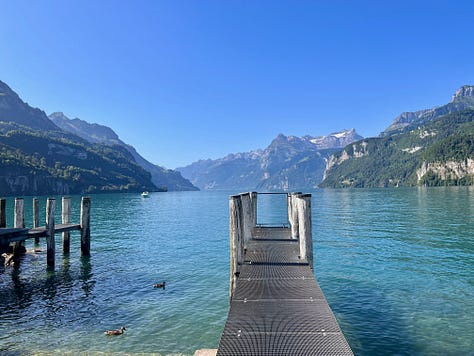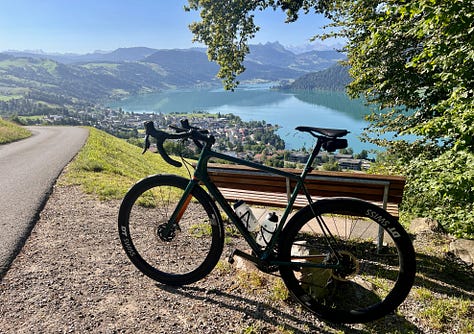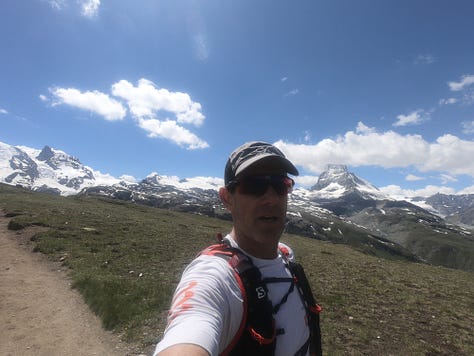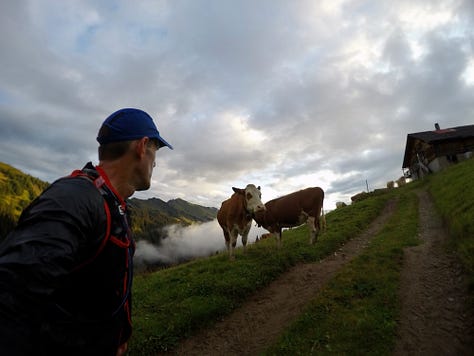What's up with the Advisory Commission, and personal stuff
Including, moving back to the US after living in Europe for 10 years, travel, and then Covid
First, a bit of personal catch-up. After ten years of living in Europe, the whole family now resides in the United States. That wording is intentionally a bit strange since my wife and daughter moved back here two years ago. Our son and I were fortunate to remain in Switzerland, near Zürich, to allow him to finish high school. The wife moved because of her job, and the daughter sought a new adventure. When attending an international school in Korea didn’t work out (the Hagwon culture is robust even at international schools there, so she would not get the experience she and we wanted for her), she attended a school outside of Boston… as an international student since she didn’t have a US address yet and hadn’t attended a US school since kindergarten.1 Now the family is in the same country, which is nice. However, the daughter is now at school in California, and the son started university (in Boston), so technically, we’re now empty-nesters.
On the PhD side, my program is on pause (“interruption”) as moving from Switzerland was time-consuming. From shutting down accounts, disposing of things (identifying what will move with us, and donating, selling, gifting, or disposing of the rest) to the general details of winding down a residency in the same place for the previous seven years, there was no way I’d be able to work on the PhD.2 Further, following the move was a family holiday to Korea for two weeks (before which I tore a soleus muscle in a calf, and during which I made the tear larger, so no running for me since this trip), then a whole day at home before flying to California to move the daughter into her school. Back to Boston (which I guess I should start to call home), receiving the shipment from Switzerland, and then… then coming down with Covid for the first time on 30 August. Right now, I only have an infrequent cough and eagerly await testing negative to get out of quarantine. The PhD resumes in just under two weeks, as in that’s when I start paying tuition again, and the clock resumes ticking. Next month, I’ll be at the Truman Library for research.
That’s generally the state of my life now. Some pictures and other comments are at the end.
A short time ago, I read with amusement the outrage around the nomination of Elliott Abrams to the Advisory Commission on Public Diplomacy. As far as I could tell, the veritable pearl-clutching was based on the false assumption that the commission was relevant or mattered. I’d wager the most vocal opponents had no idea – and probably still don’t – what the commission does or who the current members are. More importantly, the protests are likely wholly ignorant of what the commission, including the commissioners and the (apparently outgoing) executive director, failed to do based on a track record of more than a decade. Put another way, the apprehension about the nomination of Abrams seems to be that his presence would change the commission from useless to something more active. Will this be true, or will he simply enjoy the title, perceived to be something by some, and increased access to the State Department and advantages for traveling abroad?
The hollering in much ado about nothing. If the concern is that Abrams will somehow hijack the commission, I’m all for it. The commission, to be overly generous, is moribund. The commissioners are just enjoying the title, free flights to DC (commissioners are not paid, but they are reimbursed for expenses), and possibly additional access, assuming they use this access,3 for which there is no evidence Congress, the State Department, or the White House, the three main “clients” of the commission, benefit, let alone the tax-payer. I’ll return to the “client” issue below.
Look at any public meeting transcript or report over the past dozen years – start with the commission’s website – and Google the commissioners. Let me know if you can find any evidence the commissioners are interested, knowledgeable, or influential around the issues that fall under the broad umbrella of “public diplomacy.” Let me note that two of the commissioners, including the present chairman, were appointed in 2011 when I was the executive director of this advisory commission. The third commissioner was appointed to this role in 1990, served until 1997, and was reappointed in 2008.4
Consider whether you have heard of the commission before and, if you have, if you consider the commission a resource for “public diplomacy.” Has a current commissioner, each of whom has at least a dozen years to become recognized as a subject matter expert, been asked to testify before Congress or been asked for their informed advice on public diplomacy structures, personnel systems, training, interagency issues, matters of policy related to public diplomacy, budgets, or in related areas of disinformation, misinformation, or political warfare?
A long time ago, I sat down with Ed Feulner, then head of the Heritage Foundation and previously the chairman of the advisory commission in the 1980s, to discuss the commission. He reflected on the past importance and utility of the body and the gravitas it held. At one of his meetings as chairman, he enjoyed telling me, the commission had two special guests: the President of the United States and the Secretary of State. It is impossible to imagine the commission having such guests today. Back in 1967, the commission’s chairman, Dr. Frank Stanton, was testifying before the Senate Foreign Relations Committee to pick another but certainly not the only relevant example. Stanton was not just the commission’s chair, he had been the president of CBS and, until the week before this specific hearing, served as the chairman of RAND Corporation. Today, I’m pressed to imagine one of the commissioners testifying from a position of knowledge, let alone being sought out as a subject matter expert.5
Abrams could disrupt this commission if he is willing to engage, sparking a reaction to put onto the commission similar members willing to engage if only to counter Abrams. A dozen years ago, I spoke with some commissioners about my intent to re-elevate the commission's perceived utility and actual value so that many of the then-current members would not have been deemed to have an adequate resume for nomination. Those commissioners agreed, often remarking they had no business to be there.
It may be useful to recall the commission is supposed to have seven members, with no more than four being from one party. The President selects the chairman. There are only three members, and there have been only three for a long time. There was the blink of an eye tenure during the Trump admin to take the membership to four, but she quickly left for another position.6
I should also mention Abrams was not this administration’s only nomination to the commission. Last session, thus pending re-nomination, Jay Snyder and Janet Keller were nominated. Jay first served as a commissioner in 2003, and I worked with him as the executive director. Keller has a fine resume, but I’m pressed to see the fit for public diplomacy.
In the end, it doesn’t matter. This body is not serious, the commissioners aren’t serious, and the executive director for the past decade was also not serious. Sure, much work was put into compiling the inventory report, but for what purpose? How actionable, relevant, and timely was that material to the government? I know the inventory requirement of the commission, as I worked with Congressional staff to write it, and I know it wasn’t meant to monopolize the time of the commission and prevent it from engaging substantive issues. Further, the commission lost its purpose. I was appalled to hear the commission felt its job was not to engage and support Congress. Congress established the commission in 1948, under an amendment to the bill that would eventually be known as the Smith-Mundt Act, to provide expert and timely advice to Congress, in addition to the President and the Secretary of State.7 The commission was part of a broad, cross-government appreciation of the need to include experts to provide both oversight and recommendations. When the executive director doesn’t push an agenda or pushes it in ways meaningless to the strategic and tactical needs of government, and the commissioners are just as disinterested, we have what we do today and for the past decade.
Confirm Abrams to the commission. Maybe it’ll bring some much-needed sunlight to this now-useless but potentially tremendously valuable organization.
As I wind this note up, I’ll miss Switzerland. Living there for seven years, my German took a hit with Covid as I stopped speaking German, but more Swiss-German (Schweitzer-Düütsch) from different dialects crept into my speaking, mainly though not entirely because of my traveling around for outdoor archery competitions (3D archery) and joining 3-4 “natives” for a whole day of walking the course. Don’t ask me about living in the French or Italian part of Switzerland as most of my experience in Switzerland was in the German part, though I did run several ultras in the French part and shot archery, indoor and outdoor, in the French part.
The pictures below generally come from some of my outdoor adventures. The top row: Lake Luzern during a road ride; a local pond about a mile from home that I incorporated into most trail runs; and the view from our apartment a few days before we moved. Middle row: a view during the same ride as the top-left picture and of the same lake; a local gravel/trail ride showing how scenic every day on the bike is; and running with the Matterhorn in the background. Third row: I took my gravel bike up to ride near the Matterhorn a few times, my gravel bike is at the right of the frame (this ride was only 22 miles but had over 6100’ of climbing); riding in my local forest was always cathartic; and a couple of hours into an ultra in the French part with spectating cows. One thing I’ll miss, among countless things, are the ubiquitous cowbells. That was truly a joy to hear and see, whether it was far away from remnants of civilization or just outside of towns. That and the views, the safety, the quality of food, the banking system (which makes the US financial system look downright primitive), healthcare, public transportation, and easy access to other places.









Sadly, my white gravel bike – a 3T Exploro – didn’t make the trip. The frame broke trying to remove the seat post to get into my bike box. The replacement frame, with all my components put on it, will leave Switzerland in the next day. Where I’ll ride it, I don’t know yet, but I know I won’t be going for 5a rolls in the forest like I did there.8
That’s it for now. I’m not committing to any semblance of a publishing schedule as I need to figure out my life’s schedule here since everything has changed with the move and now being empty-nesters and the need to prioritize the PhD. More later.
By the way, let me know if there’s a topic you’d like me to explore and I’ll see if it fits my schedule.
When we lived in the UK, both kids were in British schools. In Switzerland, they were in an international school, not an American school.
Fun fact: in our seven years in the same apartment outside of Zürich overlooking Lake Zürich with a view of the largest city in the country down the lake to alpine mountains and with a forest right out the door, the rent changed only once. The rent decreased due to mortgage rates changing. Thus, the cost to the owner decreased, and the savings was passed to the tenants. One change in seven years and that change was a reduction in rent.
Commissioners used to receive security clearances, State Department access badges, and Diplomatic passports, but I don’t know if this is still the case. From my perspective, there is zero evidence that the commission benefited from commissioners holding these perks for the last dozen years. As the executive director, I tried to have classified meetings for the commissioners to increase their information levels, but this was inconvenient for most of them.
In December 2011, as the executive director, I started the inquiry into the issues around the tenures of Under Secretaries of State for Public Diplomacy and Public Affairs. I have a similar tenure chart of members of this commission, a chart that is most useful in not the length of tenure or turnover but the resumes and relevant stature of appointees.
I continue to hear from people in DC, whether in Congress or State or other organizations, to talk about public diplomacy-related issues, often about organizational and conceptual issues, or about authorities and legislation. Often, I point out that what they are asking for is right up the commission’s alley, to which, to a person, the reply goes like this: “what’s the advisory commission on public diplomacy?” My “favorite” moments are when the person I said this to is Foreign Service Officer working in this space and is not familiar or completely unfamiliar with how the commission could help or even why they should see the commission as a resource. Of course, their perception of the commission, notably the lack of a perception, is entirely valid since the commission entirely fails to be relevant to these stakeholders.
During my time as executive director, there were six commissioners. However, one was eager to be replaced as they admitted they now had zero time for the commission, but they didn’t want to resign for the sake of the optics for the commission. When the Obama administration appointed a Dem to shift the 4-3 majority from R to D, instead of replacing this Republican appointee who was desperate to be relieved of their responsibilities (and, honestly, clear guilt for not having the time to engage), the administration replaced an eager, engaged, and very active Republican commissioner.
For the nerds reading this, the amendment came from Representative Everett Dirksen (R-IL), later Sen. Dirksen. The Dirksen amendment was a response to the effort by the State Department’s Assistant Secretary for Public Affairs, a position that had a vastly greater portfolio and authority than today’s Under Secretary for Public Diplomacy, to establish an advisory committee that would later be the basis of a permanent advisory commission on information. At the time, the assistant secretary’s committee included the vice president of CBS, a university president, the president of Time, Inc., advertising executives, and newspaper editors and publishers.
I couldn’t get the seat post clamp to release and feared damaging the frame. So I took the bike to my trusted bike shop… where they broke the frame. Better them than I as they have insurance for that stuff. So, I’ll be getting a new-old bike. The frame is the same model, just 2023 instead of 2017, and 3T revised the seat-clamp as my problem was a known problem.


David Pecker and Rupert Murdoch must know how covers of the National Enquirer follow CIA psyops media manipulation disparaging Hillary Clinton during the 2016 presidential election. Please see Dr. Fred Landis 1982 article on CIA Psychological Warfare "psyops" in Chile, Nicaragua and Jamaica, Science for the People January/February 1982 vol.14 #1.